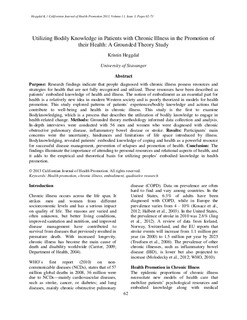Utilizing bodily knowledge in patients with chronic illness in the promotion of their health: A grounded theory study
Journal article, Peer reviewed
Permanent lenke
http://hdl.handle.net/11250/2365583Utgivelsesdato
2013Metadata
Vis full innførselSamlinger
Originalversjon
Heggdal, K. (2013) Utilizing bodily knowledge in patients with chronic illness in the promotion of their health: A grounded theory study. Californian Journal of Health Promotion 2013, 11(3):62-73Sammendrag
Purpose:
Research findings indicate that people diagnosed with chronic illness possess resources and strategies for health that are not fully recognized and utilized. These resources have been described as patients’ embodied knowledge of health and illness. The notion of embodiment as an essential part for health is a relatively new idea in modern Western society and is poorly theorized in models for health promotion. This study explored patterns of patients` experiences/bodily knowledge and actions that contribute to well-being and health in chronic illness. This study is the first to examine Bodyknowledging, which is a process that describes the utilization of bodily knowledge to engage in health-related change.
Methods:
Grounded theory methodology informed data collection and analysis. In-depth interviews were conducted with 56 men and women who were diagnosed with chronic obstructive pulmonary disease, inflammatory bowel disease or stroke.
Results:
Participants' main concerns were the uncertainty, hindrances and limitations of life space introduced by illness. Bodyknowledging, revealed patients' embodied knowledge of coping and health as a powerful resource for successful disease management, prevention of relapses and promotion of health.
Conclusion:
The findings illuminate the importance of attending to personal resources and relational aspects of health, and it adds to the empirical and theoretical basis for utilizing peoples' embodied knowledge in health promotion.
Beskrivelse
The article was originally published in the open access Californian Journal of Health Promotion in 2013.
